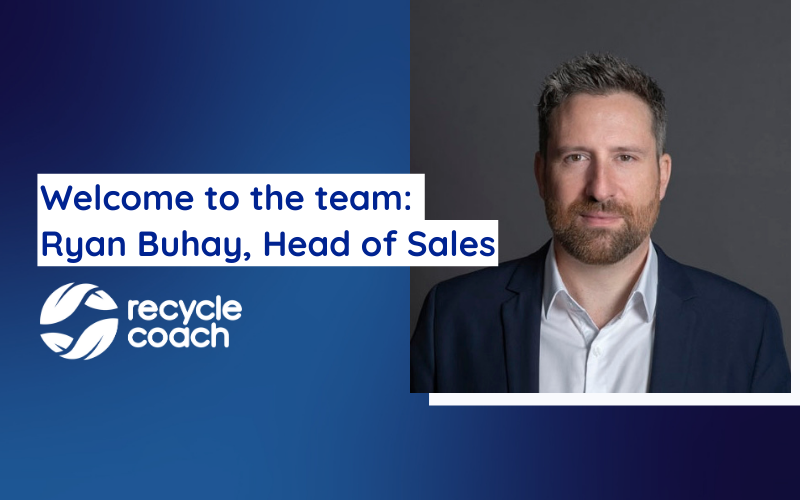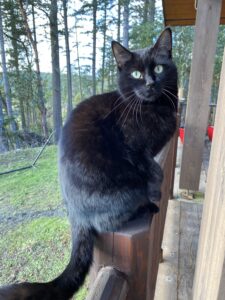Meet Ryan Buhay, Recycle Coach Head of Sales

We are thrilled to welcome Ryan Buhay to the Recycle Coach team! As our new Head of Sales, Ryan joins us with more than a decade of experience in the industry, as well as an incredible passion for helping teams of all shapes and sizes reduce contamination and solve communication problems. Ryan calls himself ‘the recycling guy’ – and it’s no secret why.
Tell us a little bit about yourself. How did your career get started?
It sort of happened by accident! I had finished university and wasn’t quite sure where I was going to end up. I was looking for a job when I got the opportunity to be an Educational Coordinator for a recycling company that was getting ready to launch the first single-stream program in Saskatchewan.
It was a complete crash course, and I very quickly became fascinated with the MRF and the entire recycling process. From the challenges of contamination and just how difficult it is to keep a clean recycling stream, to the implications of not recycling and how that impacts landfills and the community — and I’ve been in the industry ever since.
Over the last ten years, I’ve worked with hundreds of organizations to solve their local problems through digital tools and modern technology. Long story short, I feel like I’m a recycling guy at my core. When I talk with Recycling Coordinators or Sustainability Directors about getting residents to understand their recycling program, that’s my lived experience.
What surprised you most about the industry?
The sheer amount of technology in a MRF. When I started, I had no clue about where recycling goes and the rate at which it’s processed into marketable commodities – which is ultimately what makes something recyclable – and I was fascinated by that aspect. Recycling isn’t magic. It’s a business. And helping people understand that is a game changer.
The MRF workers are the unsung heroes of the industry. The amount of labour it takes to process recycling and remove contaminants from a stream is incredible, and incredibly difficult. That’s what motivated me as an educator to make their lives easier, because of how dangerous and fast that job is. We’d see things like car parts, bulky items, sharps – so many different items people would throw into dumpsters that didn’t belong. And that all stems from the lack of education in a municipality on what goes where and what happens to the material after it leaves the curb.
What would you say is the key to success for a recycling program?
Taking the time to tell the story behind recycling. The more residents understand about the chain of custody, the better the recycler they’re going to be. People are looking for a quick answer. Modernizing the approach and watching the tide shift from more traditional methods to utilizing digital tools has been really interesting and what’s been so successful for a lot of cities I’ve had the pleasure of working with.
What about your work now do you enjoy the most?
I love helping people solve problems. Every municipality, every waste hauler, every university – they all deal with getting a handle on contamination or call volume about their collection day, or helping new residents find information about their waste program. It’s a tall order for small teams with limited resources to answer those calls and emails or to be able to proactively reach every single resident.
I feel like I’m less of a sales guy and more of a recycling industry guy at large, and I love being able to help people based on what I’ve learned over the last decade – here’s what I know works and what’s been successful.
What excites you most about joining the Recycle Coach team?
The focus on strategic partnerships and the openness to work with any organization that shares our goal of ending contamination. Whether they are a customer or not – how can we work together and continue to innovate in the space? Let’s find a way to do that.
Being a smaller team, we have a unique opportunity to be more agile when it comes to product innovation and development and to help build solutions.
As a previous Educator, Recycle Coach has always been known for focusing on empowering the residents it serves. Having engaging activities like quiz questions or short lessons being incorporated seamlessly into the app is huge for the industry.
What is your best recycling tip?
It all comes back to the MRF. Across Canada and the United States, there are so many different systems. Taking that extra 5-10 minutes to do some research and understand where your recycling goes and how it’s processed is huge. The more you understand your MRF and the concept of processing, the better you’re going to understand the do’s and don’ts of your program and the better recycler you’re going to become.
Anything around the house or in your day-to-day life?
To me, zero waste is a mindset. How can we reduce waste as much as possible? Of course, I try to avoid single-use items like straws and bags, but I apply that mentality to every purchase and try to avoid buying things I don’t need. As a father of a two-year-old, it’s easier said than done, but I try to be as conscientious as I can when it comes to consumer choices, the packaging products come in and not buying things I don’t need.
Best piece of advice you’ve received at work?
Getting the answer ‘no’ doesn’t mean no forever. It goes back to starting my career at the MRF when I had a lot of crazy, huge ideas, and it taught me how to articulate my vision, rather than ask for something. Crawl, walk, run is something that I think is important, especially when working with communities that want to take on a digital solution. We need to start with the foundation and then build on that, piece by piece.
What would you say to someone who is interested in getting into the solid waste industry for the first time?
You’re never going to get the smell off of you. It’s such an interesting industry and offers so many different career opportunities that it’s hard to leave, and even harder not to come back if you do. Don’t be afraid to get your hands dirty. Going into a MRF for the first time can be a bit of a shock – it’s hot, dusty, fast-paced – but that’s where everything happens.
It’s a very humbling experience. Wear gloves, cover-alls, nose plugs, whatever you need – but it’s something you have to do to understand what MRF workers do on a daily basis, and to understand what’s really going on in your community and how residents are participating in your program.
Bonus round time. Favorite ice cream flavor.
Haagan-Dazs chocolate peanut butter. I can destroy an entire pint like it’s nothing.
What was your dream job as a kid?
It changed over and over and over – but stand-up comedian.
Do you know any recycling jokes?
Recycling is no laughing matter!
Who is Spooky?
Spooky is my cat! He was famously recycled in Saskatoon in 2016.

Working in the MRF, I had this thing called the Wall of Shame. The workers on the line would bring any weird item that came through down to my office. I had a samurai sword, a Super Nintendo, all of these trinkets. It was my guiding light that reminded me I still have work to do!
One day, they brought down a live kitten. He’d had quite a journey since the only way in is from a truck that captures residential curbside material, so from the curb to the tipping floor, scooped up and dropped into the drum feeder, and then rescued from the pre-sort conveyor belt. They brought him down to me and thankfully, he was totally fine, albeit a little dusty and a little stinky.
My girlfriend at the time – now wife – was in veterinary school, so we obviously took him home after having no luck at the SPCA. We named him Spooky after my original childhood cat and he’s been our best bud ever since.